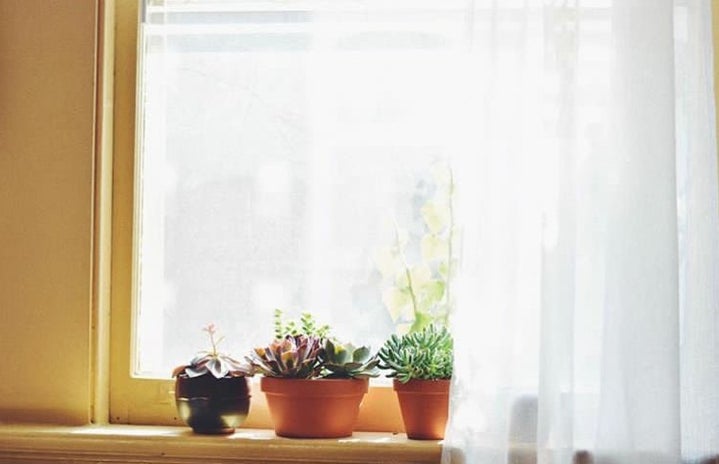In the age of the coronavirus, we’ve become accustomed to using throw-away containers, plastic cups and utensils, and single-use masks. While these are safe germ-free options, they create waste that damages our already fragile environment.
- Take a Carbon Footprint Test
-
A Carbon Footprint Test is a series of questions that approximates how much your daily and weekly practices contribute to carbon dioxide emissions. These emissions contribute to the breakdown of the ozone layer and climate change. Yes – you are only one person, but it’s informative to discover how much your practices can affect the world around you. Most of the activities that add to your carbon footprint can actually be prevented or reduced. You don’t know where you can improve until you understand where you’re falling short.
- Reusable Water Bottles and Tupperware
-
Since the cafeteria is only allowed to provide us with single-use food containers and utensils, you have the option to bring your own reusable ones. Bringing a reusable water bottle or Tupperware container is a great option to reduce waste! Just make sure not to share them with others and wash often to prevent the spread of germs.
- Shop Smart
-
Rather than buying clothes or cosmetics from big chains, you can make the switch to local and sustainable stores. Thrift shopping has become a huge trend, not only for the good prices but for the sustainability involved with rewearing and repurposing old clothing. Fyre Vintage (@fyrevintage on Instagram) is a sustainable black-owned store that has online shopping options for your convenience. If you do want to shop at a chain store, try to look into their environmental practices. The Happy Hippie is a useful website to check how big chains are responding to the environmental crisis. Remember, each dollar you spend is like a vote towards that company’s practices!
- Get Planting
-
Not only are plants adorable and great for decorating, but they are also great for keeping your room clean. Plants are natural air purifiers. They’re a great alternative to using aerosol sprays, which release dangerous chemicals into your room and clog up your breathing space. We also unknowingly drag germs and chemicals into our rooms on the bottom of our shoes. Plants can clear the air of these harsh and unwanted chemicals. Spider plants and Dragon Trees are known for being great air purifiers!
- Walk to Campus
-
While the weather is nice, walking to campus can be a simple solution for commuters with nearby off-campus housing. You’ll boost your mood with a nice walk and help save on air pollution from driving.
- Unplug Your Electronics
-
It’s crazy to believe that our electronics still suck up electricity when they’re not being used. Leaving your charger in the socket all day while you’re in class actually uses up electricity. Although this may seem harmless, electricity use is one of the main contributors to carbon dioxide emissions. Unplugging your electronics or even switching off your extension cord when you aren’t using it can really make a difference. Plus, if you live off-campus and pay for your electricity, it can save you money on your utility bills.
- Change Up Your Notebooks
-
Reducing paper use saves trees, which are not only necessary for providing oxygen but also act as a carbon bank. Trees store carbon dioxide buildup and prevent dangerous greenhouse gas from entering the atmosphere. Something as simple as switching to a google doc for taking notes can make a huge impact. Or, if you prefer seeing your notes written down, you can invest in a notebook made from recycled paper or switch to a binder. A binder would only require as much paper as you need for that semester, whereas a notebook forces you to throw out any blank pages you didn’t use.
- Bring Reusable Bags With You
-
New York State has been tremendous in its efforts to reduce plastic waste by banning plastic bags. It’s important to follow this policy and bring a reusable bag with you on your next shopping or grocery trip. Plastic bags are still available for purchase at grocery stores, so not using them will also save you money. If you forget your bag, try to ask for a paper bag or just carry your items to your car if you only bought one or two things. If you have old plastic bags laying around, you can repurpose them as garbage bags, food containers, and more.
- Eat Less Meat
-
Meat production results in high water waste and greenhouse gas emissions. To reduce your contribution to these two issues, try making simple swaps for meat in your day-to-day eating habits. Vegan “meat imitation” products are becoming more common and flavorful as veganism grows in popularity. These are great alternatives to meat products. Or, if you are an avid meat-eater, you can try starting by avoiding meat for one day a week.
- Appreciate Nature
-
This one takes very little effort at all. Just spending time outside, admiring the sunset at night, or hiking can help. Sure, it’s not necessarily “doing” anything, but it does help you understand why being environmentally conscious is so important. Without Mother Nature, we wouldn’t be here. Appreciate the environment and do what you can to give back, no matter how big or small of a change you make.


